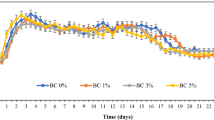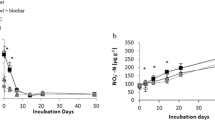Abstract
This paper examines the effectiveness of combining biochar and compost to test if organic fertilizers can be enhanced by the addition of biochar in the active phase of composting high-nitrogen source materials. Therefore, a small-scale experiment was conducted for 40 days to investigate the effects of nitrogen conservation. Four composting piles including a control without biochar were prepared with 18 kg of shredded immature Panicum maximum grass and 2 kg of Gliricidia sepium leaves. Biochar additions were 3%, 6%, and 9% calculated on dry weight basis. There was no significant difference between treatments for temperature (~ 29.5 °C) and pH (~ 9). A novel material balance approach based on total fixed solids provided the means to determine the actual volatile solid contents, i.e., nitrogen levels during the decomposition process. According to this, the actual nitrogen content of 6% biochar mixed pile (16.203 mg/g) was significantly different to the others by having a higher mean value. Similarly, the mean nitrogen loss was lower (− 5.66%) than measured in the other treatments. Nitrogen loss is low in the biochar mixed piles because of nitrogen adsorption compared with 24% loss in control. The kinetic study on nitrogen postulates entrapping ammonia production and increasing enzyme urease activities. First-order rate kinetics could be used to predict the reduction of C/N ratio of 30 to 9 in 65 days. Hence, 6% biochar treatment was discovered to be the optimum to prevent excessive oxidation or volatilization of ammonia during the active phase low-temperature composting and fix atmospheric nitrogen.







Similar content being viewed by others
References
Adams RC, MacLean FS, Dixon JK, Bennett FM, Martin GI, Lough RC (1951) The utilization of organic wastes in N.Z. Second interim report of the inter-departmental committee. N Z Eng 6:396–424
Agegnehu G, Bird MI, Nelson PN, Bass AM (2015) The ameliorating effects of biochar and compost on soil quality and plant growth on a Ferralsol. Soil Res 53:1–12. https://doi.org/10.1071/SR14118
Agegnehu G, Srivastava AK, Bird MI (2017) The role of biochar and biochar-compost in improving soil quality and crop performance: a review. Appl Soil Ecol:156–170. https://doi.org/10.1016/j.apsoil.2017.06.008
Agyarko-Mintah E, Cowie A, Singh BP, Joseph S, Zwieten LV, Cowie A, Harden S, Smillie R (2017) Biochar increases nitrogen retention and lowers greenhouse gas emissions when added to composting poultry litter. Waste Manag 61:138–149. https://doi.org/10.1016/j.wasman.2016.11.027
Ariyawansha RTK, Basnayake BFA, Karunarathna AK, Mowjood MIM (2018a) Extensions to Michaelis-Menten kinetics for single parameters. Sci Rep 8:16586. https://doi.org/10.1038/s41598-018-34675-2
Ariyawansha RTK, Basnayake BFA, Karunarathna AK, Gnanakaran M (2018b) Performance evaluation of a laboratory scale leachate treatment bioreactor with a biofilter liner system by application of Michaelis-Menten kinetics. In: Proceedings of the 10th Asia-Pacific Landfill Symposium, Tokyo, 24th - 26th November 2018
Awasthi MK, Wang Q, Ren XN, Zhao JC, Huang H, Awasthi SK, Lahori AH, Li RH, Zhou LN, Zhang ZQ (2016) Role of biochar amendment in mitigation of nitrogen loss and greenhouse gas emission during sewage sludge composting. Bioresour Technol 219:270–280. https://doi.org/10.1016/j.biortech.2016.07.128
Azim K, Soudi B, Boukhari S, Perissol C, Roussos S, Alami IT (2018) Composting parameters and compost quality: a literature review. Org Agric 8(2):141–158. https://doi.org/10.1007/s13165-017-0180-z
Barrington S, Choiniere D, Trigui M, Knight W (2002) Effect of carbon source on compost nitrogen and carbon losses. Bioresour Technol 83(3):189–194. https://doi.org/10.1016/S0960-8524(01)00229-2
Chapman JL, Reiss MJ (1992) Ecology: principles and applications. Cambridge University Press, Cambridge
Chowdhury AKMB, Akratos CS, Vayenas DV, Pavlou S (2013) Olive mill waste composting. Int Biodeterior Biodegradation 85:108–119. https://doi.org/10.1016/j.ibiod.2013.06.019
Clough T, Condron L, Kammann C, Muller C (2013) A review of biochar and soil nitrogen dynamics. Agron J 3(2):275–293. https://doi.org/10.3390/agronomy3020275
Cooperband L (2002) The art and science of composting: a resource for farmers and compost producers, Center for Integrated Agricultural Systems. University of Wisconsin-Madison, Madison https://www.cias.wisc.edu/wp-content/uploads/2008/07/artofcompost.pdf
Darch T, Blackwell MSA, Chadwick D, Haygarth PM, Hawkins JMB, Turner BL (2016) Assessment of bioavailable organic phosphorus in tropical forest soils by organic acid extraction and phosphatase hydrolysis. Geoderma 284:93–102. https://doi.org/10.1016/j.geoderma.2016.08.018
Ding Y, Liu Y, Liu S, Li Z, Tan X, Huang X, Zeng G, Zhou L, Zheng B (2016) Biochar to improve soil fertility. A review. Agron Sustain Dev 36:36. https://doi.org/10.1007/s13593-016-0372-z
Edmeades DC (2003) The long-term effects of manures and fertilisers on soil productivity and quality: a review. Nutr Cycl Agroecosyst 66:165–180. https://doi.org/10.1023/A:1023999816690
Eghball B, Power JF, Gilley JE, Doran JW (1997) Nutrient, carbon, and mass loss during composting of beef cattle feedlot manure. J Environ Qual 26:189–193 https://digitalcommons.unl.edu/biosysengfacpub/130
Fischer D, Glaser B (2012) Synergisms between compost and biochar for sustainable soil amelioration, management of organic waste. In: Kumar S, Bharti A (eds) IntechOpen. https://doi.org/10.5772/31200
Garcıa-Gil JC, Plaza C, Soler-Rovira P, Polo A (2000) Long-term effects of municipal solid waste compost application on soil enzyme activities and microbial biomass. Soil Biol Biochem 32(13):1907–1913. https://doi.org/10.1016/S0038-0717(00)00165-6
González G, Lodge DJ (2017) Review: soil biology research across latitude, elevation and disturbance gradients: a review of forest studies from Puerto Rico during the past 25 years. Forests 8:178. https://doi.org/10.3390/f8060178
Hao X, Benke MB (2008) Nitrogen transformation and losses during composting and mitigation strategies. Dyn Soil Dyn Plant 2(1):10–18 http://www.globalsciencebooks.info/Online/GSBOnline/images/0812/DSDP_2(SI1)/DSDP_2(SI1)10-18o.pdf
Haug RT (1993) Process kinetics and product stability. In: The practical handbook of compost engineering. Lewis Publishers, Boca Raton, pp 335–383
Hicks LC, Meir P, Nottingham AT, Reay DS, Stott AW, Salinas N, Je W (2019) Carbon and nitrogen inputs differentially affect priming of soil organic matter in tropical lowland and montane soils. Soil Biol Biochem 129:212–222. https://doi.org/10.1016/j.soilbio.2018.10.015
Horrocks A, Horne PA, Davidson MM (2018) Demonstrating an integrated pest management strategy in forage- and seed-brassica crops using a collaborative approach. N Z Plant Prot 71:112–120. https://doi.org/10.30843/nzpp.2018.71.118
Hua L, Wu W, Liu Y et al (2009) Reduction of nitrogen loss and Cu and Zn mobility during sludge composting with bamboo charcoal amendment. Environ Sci Pollut Res 16:1–9. https://doi.org/10.1007/s11356-008-0041-0
Hubbe MA, Nazhad M, Sánchez C (2010) Composting as a way to convert cellulosic biomass and organic waste into high-value soil amendments: a review. BioResources 5(4):2808–2854
Jaafar NM, Clode PL, Abbott LK (2015) Soil microbial responses to biochars varying in particle size, surface and pore properties. Pedosphere 25(5):770–780. https://doi.org/10.1016/S1002-0160(15)30058-8
Jenkins J (2005) The Humanure Handbook. A guide to composting human manure. Joseph Jenkins, Inc., Grove City
Jiang T, Schuchardt F, Li GX, Guo R, Luo YM (2013) Gaseous emission during the composting of pig feces from Chinese Ganqinfen system. Chemosphere 90:1545–1551. https://doi.org/10.1016/j.chemosphere.2012.08.056
Kim E, Lee DH, Won S, Ahn H (2016) Evaluation of optimum moisture content for composting of beef manure and bedding material mixtures using oxygen uptake measurement. Asian-Australas J Anim Sci 29(5):753–758. https://doi.org/10.5713/ajas.15.0875
Lehman J, Joseph S (2009) Introduction. In: Lehman J, Joseph S (eds) Bio-char for environmental management: science and technology. Earthscan, London, pp 1–12
Lehmann J, da Silva JP, Steiner C, Nehls T, Zech W, Glaser B (2003) Nutrient availability and leaching in an archaeological Anthrosol and a Ferralsol of the Central Amazon basin: fertilizer, manure and charcoal amendments. Plant Soil 249:343–357. https://doi.org/10.1023/A:1022833116184
López-Cano I, Roig A, Cayuela ML, Alburquerque JA, Sánchez-Monedero MA (2016) Biochar improves N cycling during composting of olive mill wastes and sheep manure. Waste Manag 49:553–559
Malińska K, Zabochnicka-Świątek M, Dach J (2014) Effects of biochar amendment on ammonia emission during composting of sewage sludge. Ecol Eng 71:474–478. https://doi.org/10.1016/j.ecoleng.2014.07.012
Malińska K, Golańska M, Caceres R, Rorat A, Weisser P, Ślęzak E (2017) Biochar amendment for integrated composting and vermicomposting of sewage sludge—the effect of biochar on the activity of Eisenia fetida and the obtained vermicompost. Bioresour Technol 225:206–214. https://doi.org/10.1016/j.biortech.2016.11.049
Margalef O, Sardans J, Fernández-Martínez M, Molowny-Horas R, Janssens IA, Ciais P, Goll D, Richter A, Obersteiner M, Asensio D, Peñuelas J (2017) Global patterns of phosphatase activity in natural soils. Sci Rep 7:1337. https://doi.org/10.1038/s41598-017-01418-8
Meng J, Wang LL, Liu XM, Wu JJ, Brookes PC, Xu JM (2013) Physicochemical properties of biochar produced from aerobically composted swine manure and its potential use as an environmental amendment. Bioresour Technol 142:641–646. https://doi.org/10.1016/j.biortech.2013.05.086
Midingoyi SG, Kassie M, Muriithi B, Diiro G, Ekesi S (2019) Do farmers and the environment benefit from adopting integrated pest management practices? Evidence from Kenya. J Agric Econ 70(2):452–470. https://doi.org/10.1111/1477-9552.12306
Miguel RT (2010) Bio-char as a strategy for sustainable land management, poverty reduction and climate change mitigation/adaptation. Institute of Environmental Studies, Amesterdam https://publications.tno.nl/publication/34632063/8k2d1s/o10024.pdf
Mukherjee A, Lal R (2014) The biochar dilemma. Soil Res 52(3):217–230. https://doi.org/10.1071/SR13359
Olmo M, Villar R (2019) Changes in root traits explain the variability of biochar effects on fruit production in eight agronomic species. Org Agric 9(1):139–153. https://doi.org/10.1007/s13165-018-0217-y
Pagans E, Barrena R, Font X, Sa’nchez A (2006) Ammonia emissions from the composting of different organic wastes. Dependency on process temperature. Chemosphere 62:1534–1542. https://doi.org/10.1016/j.chemosphere.2005.06.044
Peigné J, Girardin P (2004) Environmental impacts of farm-scale composting practices. Water Air Soil Pollut 153:45–68. https://doi.org/10.1023/B:WATE.0000019932.04020.b6
Rathee M, Singh NV, Dalal PK, Mehra S (2018) Integrated pest management under protected cultivation: a review. Journal of Entomology and Zoology Studies 6(2):1201–1208
Shiralipou A, Mcconnell DB, Smith WH (1992) Physical and chemical properties of soil as affected by municipal solid waste compost application. Biomass Bioenergy 3(3–4):261–266. https://doi.org/10.1016/0961-9534(92)90030-T
Steiner C, Glaser B, Teixeira W, Lehmann J, Blum W, Zech W (2008) Nitrogen retention and plant uptake on a highly weathered Central Amazonian Ferralsol amended with compost and charcoal. J Plant Nutr Soil Sc 171:893–899. https://doi.org/10.1002/jpln.200625199
Sudkolai ST, Nourbakhsh F (2017) Urease activity as an index for assessing the maturity of cow manure and wheat residue vermi-composts. Waste Manag 64:63–66. https://doi.org/10.1016/j.wasman.2017.03.011
Taylor PG, Cleveland CC, Wieder WR, Sullivan BW, Doughty CE, Dobrowski SZ, Townsend AR (2017) Temperature and rainfall interact to control carbon cycling in tropical forests. Ecol Lett 20:779–788. https://doi.org/10.1111/ele.12765
Vakili M, Haque AAM, Gholami Z (2012) Effect of manual turning frequency on physico-chemical parameters during the oil palm frond and cow dung composting. Casp J Appl Sci Res 1(12):49–59
Wu DL, Liu P, Luo YZ, Tian GM, Mahmood Q (2010) Nitrogen transformations during co-composting of herbal residues, spent mushrooms, and sludge. J Zhejiang Univ Sci B 11(7):497–505. https://doi.org/10.1631/jzus.B0900271
Wu S, He H, Inthapanya X, Yang C, Lu L, Zeng G, Han Z (2017) Role of biochar on composting of organic wastes and remediation of contaminated soils—a review. Environ Sci Pollut Res Int 20:16560–16577. https://doi.org/10.1007/s11356-017-9168-1
Xiao R, Awasthi MK, Li R, Park J, Pensky SM, Wang Q, Wang JJ, Zhang Z (2017) Recent developments in biochar utilization as an additive in organic solid waste composting: a review. Bioresour Technol 246:203–213. https://doi.org/10.1016/j.biortech.2017.07.090
Yang F, Li GX, Yang QY, Luo WH (2013) Effect of bulking agents on maturity and gaseous emissions during kitchen waste composting. Chemosphere 93:1393–1399. https://doi.org/10.1016/j.chemosphere.2013.07.002
Zhang L, Sun X (2014) Changes in physical, chemical, and microbiological properties during the two-stage co-composting of green waste with spent mushroom compost and biochar. Bioresour Technol 171:274–284. https://doi.org/10.1016/j.biortech.2014.08.079
Acknowledgments
The authors are very much grateful to D. D. K. Galahitiyawa, D. M. A. S. Wasantha, Department of Agricultural Engineering, G. Herath, Department of Crop Science, Faculty of Agriculture, University of Peradeniya, and Aurora Basnayake for their support throughout the study period.
Funding
This investigation received financial support from the Faculty of Agriculture, University of Peradeniya, and National Science Foundation of Sri Lanka under Grant No. NSF/SCH/2017/09.
Author information
Authors and Affiliations
Corresponding author
Additional information
Publisher’s note
Springer Nature remains neutral with regard to jurisdictional claims in published maps and institutional affiliations.
Electronic supplementary material
ESM 1
(DOCX 80 kb)
Rights and permissions
About this article
Cite this article
Samudrika, K.P.D., Ariyawansha, R.T.K., Basnayake, B.F.A. et al. Optimization of biochar additions for enriching nitrogen in active phase low-temperature composting. Org. Agr. 10, 449–463 (2020). https://doi.org/10.1007/s13165-020-00287-2
Received:
Accepted:
Published:
Issue Date:
DOI: https://doi.org/10.1007/s13165-020-00287-2




